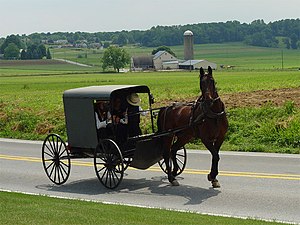Amish country

An Amish family riding in a traditional Amish buggy in Lancaster County, Pennsylvania
|
|
| Total population | |
|---|---|
| 308,030 (2016, Old Order Amish) |
|
| Founder | |
| Jakob Ammann | |
| Regions with significant populations | |
| United States (notably Pennsylvania, Ohio, and Indiana) Canada (notably Ontario) |
|
| Religions | |
| Anabaptist | |
| Scriptures | |
| The Bible | |
| Languages | |
| Pennsylvania German, Bernese German, Low Alemannic Alsatian German, Amish High German, English |
The Amish (/ˈɑːmɪʃ/; Pennsylvania German: Amisch, German: Amische) are a group of traditionalist Christian church fellowships with Swiss Anabaptist origins. They are closely related to, but distinct from, Mennonite churches. The Amish are known for simple living, plain dress, and reluctance to adopt many conveniences of modern technology. The history of the Amish church began with a schism in Switzerland within a group of Swiss and Alsatian Anabaptists in 1693 led by Jakob Ammann. Those who followed Ammann became known as Amish.
In the early 18th century, many Amish and Mennonites emigrated to Pennsylvania for a variety of reasons. Today, the most traditional descendants of the Amish continue to speak Pennsylvania German, also known as "Pennsylvania Dutch", although a dialect of Swiss German is used by Old Order Amish in the Adams County, Indiana area. As of 2000, over 165,000 Old Order Amish lived in the United States and about 1,500 lived in Canada. A 2008 study suggested their numbers had increased to 227,000, and in 2010 a study suggested their population had grown by 10 percent in the past two years to 249,000, with increasing movement to the West. Most of the Amish continue to have 6–7 children while benefitting from the major decrease in infant and maternal mortality in the 20th century. Between 1992 and 2013, the Amish population increased by 120%, while the US population increased by 23%.
...
Wikipedia
